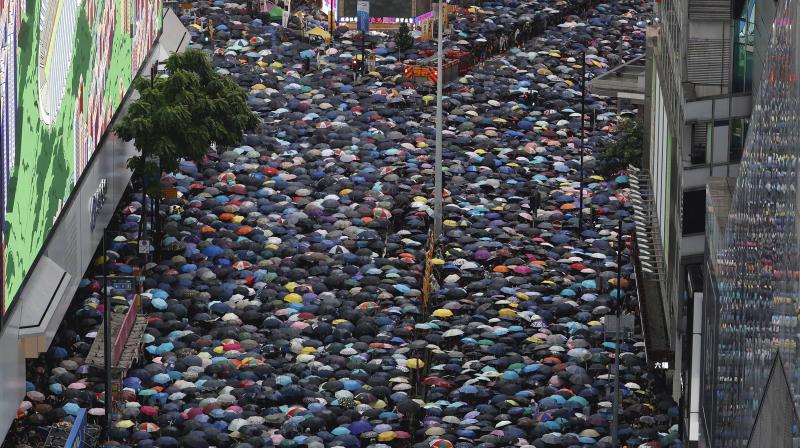Hong Kong protesters aim to \'stress test\' airport
The withdrawal was one of the protesters\' key demands and both she and Beijing had previously refused to budge on the issue.

Hong Kong: Hong Kong's pro-democracy protesters were planning to disrupt transport links to the airport on Saturday in their first mass mobilisation since the city's leader made a surprise concession earlier this week.
Millions of pro-democracy supporters have taken to Hong Kong's streets for the past three months in the biggest challenge to China's rule since the city's handover from Britain in 1997.
On Wednesday, the city's pro-Beijing leader Carrie Lam surprised many by announcing she was scrapping a hugely unpopular extradition law that sparked the widespread and sometimes violent rallies.
The withdrawal was one of the protesters' key demands and both she and Beijing had previously refused to budge on the issue. Lam, who was not directly elected but appointed by an overwhelmingly Beijing-friendly committee, portrayed the move as a bid to de-escalate tensions and start a dialogue.
But it has been widely dismissed by protesters as too little, too late after 1,100 arrests and with many facing lengthy jail sentences. Online messaging forums used by the largely leaderless movement have called for protesters to "stress test" the airport on Saturday afternoon, filling up with suggestions for how to disrupt the road and rail links leading to the terminals.
Police have said they are on standby to mobilise and keep the aviation hub up and running. "The airport is an essential infrastructure catering to travellers all around the world," Lau Wing-kee, deputy airport district commander, told reporters on Friday.
Some train and bus services to the airport were running a more restricted service in a bid to reduce the likelihood of large numbers of protesters getting to the airport, while officials advised travellers to leave extra time to get to their flights.
In recent weeks, the airport -- the world's eighth busiest -- has become a repeated target of pro-democracy protesters as they try to ramp up pressure on Beijing and city leaders by denting Hong Kong's reputation as a stable business hub. But the tactic is controversial because of the travel misery it causes -- and the fact that the target is not the state but ordinary people.
Last month hundreds of flights were cancelled over two days when huge crowds of protesters staged a sit-in at the airport, with ugly scenes playing out as two men suspected of being Chinese spies were beaten. Previous protests at the airport had been non-disruptive and peaceful, aimed at enlightening travellers about the movement's goals.
Since the violent scenes, security has been ramped up around the sprawling hub -- which lies on an artificial island west of the main city -- and access to the terminals has been restricted to those with boarding passes. But last Sunday protesters returned to the airport and showed they could still wreak havoc.
Operators of the express train that links the airport and the city suspended services after the station was besieged and objects were thrown onto the rail line, while black-clad protesters built barricades at the bus terminus and attempted to stop traffic on the main road leading to the facility.
Stranded travellers were forced to abandon their vehicles and drag their luggage along the airport road for many kilometres. Protesters have said their movement will only end when other key demands are met such as an amnesty for those arrested, an independent inquiry into police use of force and the granting of fully free elections, all of which Lam and Beijing have rejected.
At a peaceful rally on Friday night in the city's commercial district, many protesters said they planned to continue hitting the streets. "It's too late now. In these three months, a lot of people have sacrificed themselves and been arrested," said a retiree who gave his surname as Cheng, bursting into tears as he spoke.
The same night, brief volleys of tear gas were fired at small groups of more hardline protesters who were shining laser pens at a police station in the district of Mongkok, an area that has seen repeated clashes.

